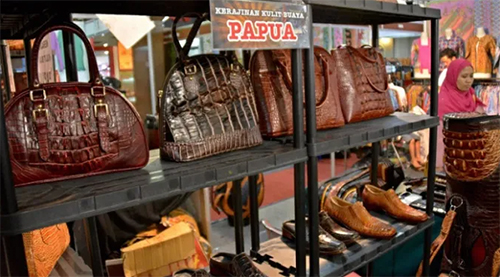
1SME Training in Papua Based on Export Partnership
The activities in West Papua were attended by SMEs in the city of Sorong and in Papua, SMEs from 3 districts/cities participated, namely Jayapura Regency, Keerom Regency and Jayapura City. This activity is a collaboration between KemenKopUKM and PGGPB (Communion of Churches of Papua and West Papua) in order to implement or carry out the mandate of Presidential Instruction No. 9 of 2020 regarding the acceleration of welfare development in Papua and West Papua provinces.
“Human resource development is carried out through technical vocational training in production and branding design for West Papua and Papua SMEs,” said Deputy Assistant for Human Resources Development at the Ministry of Cooperatives and SMEs, Dwi Andriani Sulistyowati, in a statement in Jakarta, Saturday (10/15/2022).
Dwi said Papuan SME products, especially in the craft, home decor and furniture sectors, have their own advantages and have great potential for export to foreign countries. According to Dwi, these advantages include, among other things, easy-to-obtain raw materials and very unique products, the majority of which are still original artifacts or have not undergone many changes, in the form of skills that have been passed down from generation to generation because customs are still well preserved based on local wisdom of Papuan culture.
However, because of some special constraints, some skill enhancement is needed so that Papuan products can be competitive and efficient in the manufacturing process, as well as be linked to the export SME ecosystem. Dwi explained that the special obstacles faced by Papuan SMEs were, among others, that the production process still used simple or traditional equipment, so large quantities of production required a long time. In addition, it is still necessary to build awareness of the importance of a brand or brand for a product.
In terms of financial management, it is also still not managed professionally or is still in the same pocket with household finances, so there are many financial leaks in the business. Another factor is the lack of skill regeneration for the younger generation, so that skilled workers are only owned by the older generation, most of whom are constrained by limited manpower and health.
In addition, the lack of availability of quality supporting raw materials, so that the combination of materials is improvised or less than optimal. Therefore, said Dwi, KemenKopUKM seeks to help overcome various obstacles, one of which is by carrying out HR development activities, and the follow-up requires post-training assistance processes that have been provided, especially regarding financial management, branding, new design innovation, and digital marketing.
This requires collaboration with other ministries/agencies to share roles according to their respective duties and functions. “After this stage is carried out, it is also necessary to accelerate training programs and further assistance regarding legality such as business legality and intellectual property rights or trademarks,” said Dwi.
According to Dwi, from the identification in the field, there are several proposed strategic steps so that Papuan SMEs can rise up, be sustainable, and have competitiveness. First, it is necessary to build a message to the young generation of Papua that the handicraft industry is very good in terms of its commercial potential and maintain local cultural heritage, which will become a trademark from generation to generation.
Second, it is necessary to involve the local government to build a strong branding about the exoticism of the land and culture of Papua, as well as the philosophy of high status of Papuan women who are skilled in weaving and knitting.
Third, it is also necessary to involve the local government to build centers for raw material plants such as noken plants, pandanus, grass, banana stems, and so on. Fourth, it is necessary to build a lot of production process training centers and innovative ideas that are supported by good and consistent market surveys.
Fifth, build community awareness (partnership) to synergize with each other and it will be even better if the community is a legal entity such as a cooperative.
Sixth, it needs financing support for working capital that focuses on maintaining the availability of raw materials, expanding market access, building creative ideas, and increasing production capacity. Seventh, multiply marketing channel centers in collaboration with other sectors such as tourism, education, and so on.
https://westpapuadaily.com/sme-training-in-papua-based-on-export-partnership.html
